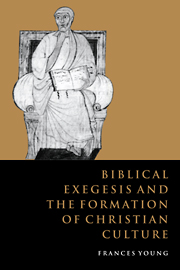Book contents
- Frontmatter
- Contents
- Preface
- List of abbreviations
- Introduction
- PART I EXEGESIS AND THE UNITY OF THE SCRIPTURES
- PART II THE BIBLE AS CLASSIC
- PART III LANGUAGE AND REFERENCE
- 6 Reference and cross-reference
- 7 The sacrament of language
- 8 Allēgoria and theōria
- 9 The question of method
- PART IV THE BIBLE AND THE LIFE OF FAITH
- Conclusion and retrospect: towards an outline historical account
- Bibliography
- 1 Index ofbiblicaI references
- 2 Index of modern scholars
- 3 Index of subjects
8 - Allēgoria and theōria
Published online by Cambridge University Press: 02 December 2009
- Frontmatter
- Contents
- Preface
- List of abbreviations
- Introduction
- PART I EXEGESIS AND THE UNITY OF THE SCRIPTURES
- PART II THE BIBLE AS CLASSIC
- PART III LANGUAGE AND REFERENCE
- 6 Reference and cross-reference
- 7 The sacrament of language
- 8 Allēgoria and theōria
- 9 The question of method
- PART IV THE BIBLE AND THE LIFE OF FAITH
- Conclusion and retrospect: towards an outline historical account
- Bibliography
- 1 Index ofbiblicaI references
- 2 Index of modern scholars
- 3 Index of subjects
Summary
Towards the end of the last chapter, we began discussing how a ‘sacramental’ understanding of language might relate to the distinction between typology and allegory. Chapter 11 will show how ultimately typology and allegory contribute to Christian mimēsis, or figural representation, both being so interwoven that a firm differentiation is very hard to make. But meanwhile we must consider the explicitly exegetical debate which emerged in the fourth century, and which is often characterised in terms of a difference between typological and allegorical exegesis – I refer of course to the Antiochene reaction against Alexandrian allegory.
Northrop Frye, whose book The Great Code provided some useful clues for us in the last chapter, speaks of allegory arising when the story-myth finds its true meaning in a conceptual or argumentative translation. Allegory ceases to be story and becomes propositional; typology, on the other hand, retains the narrative and sequence. Building on Frye, we observed that by typological exegesis, meaning is discovered in ‘universal’ narrative patterns played out in past, present and future, the intersection of particular story and storytype. We also found non-narrative types, signs and symbols like the bird signing the cross as it flies, and Moses' arms doing likewise at the battle with Amalek. We decided that the important thing was the mimetic or ikonic quality of symbol or story. What I now propose is a distinction between ikonic and symbolic mimēsis, associating the first with Antiochene exegesis, the second with Alexandrian allegory.
- Type
- Chapter
- Information
- Biblical Exegesis and the Formation of Christian Culture , pp. 161 - 185Publisher: Cambridge University PressPrint publication year: 1997



